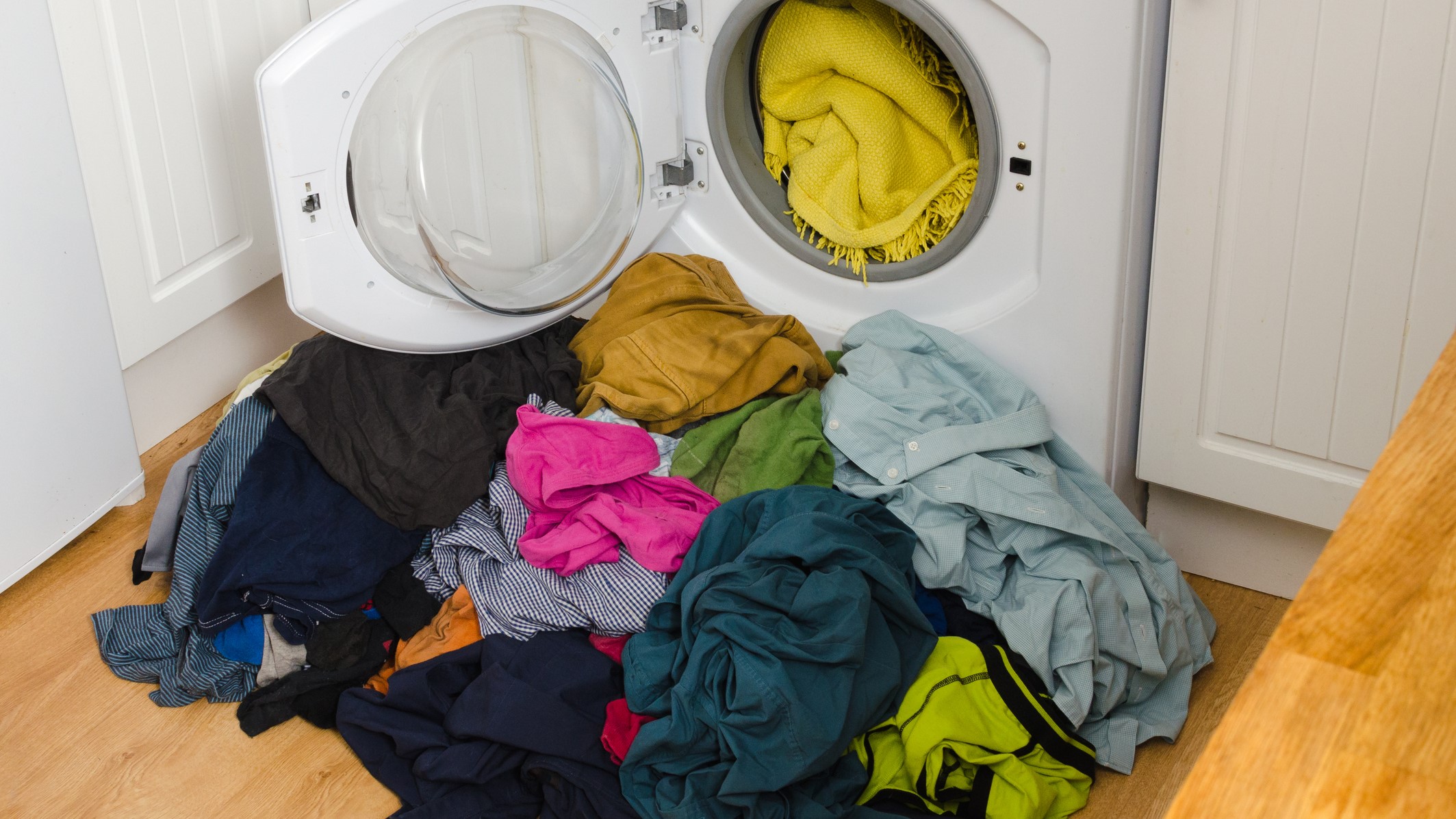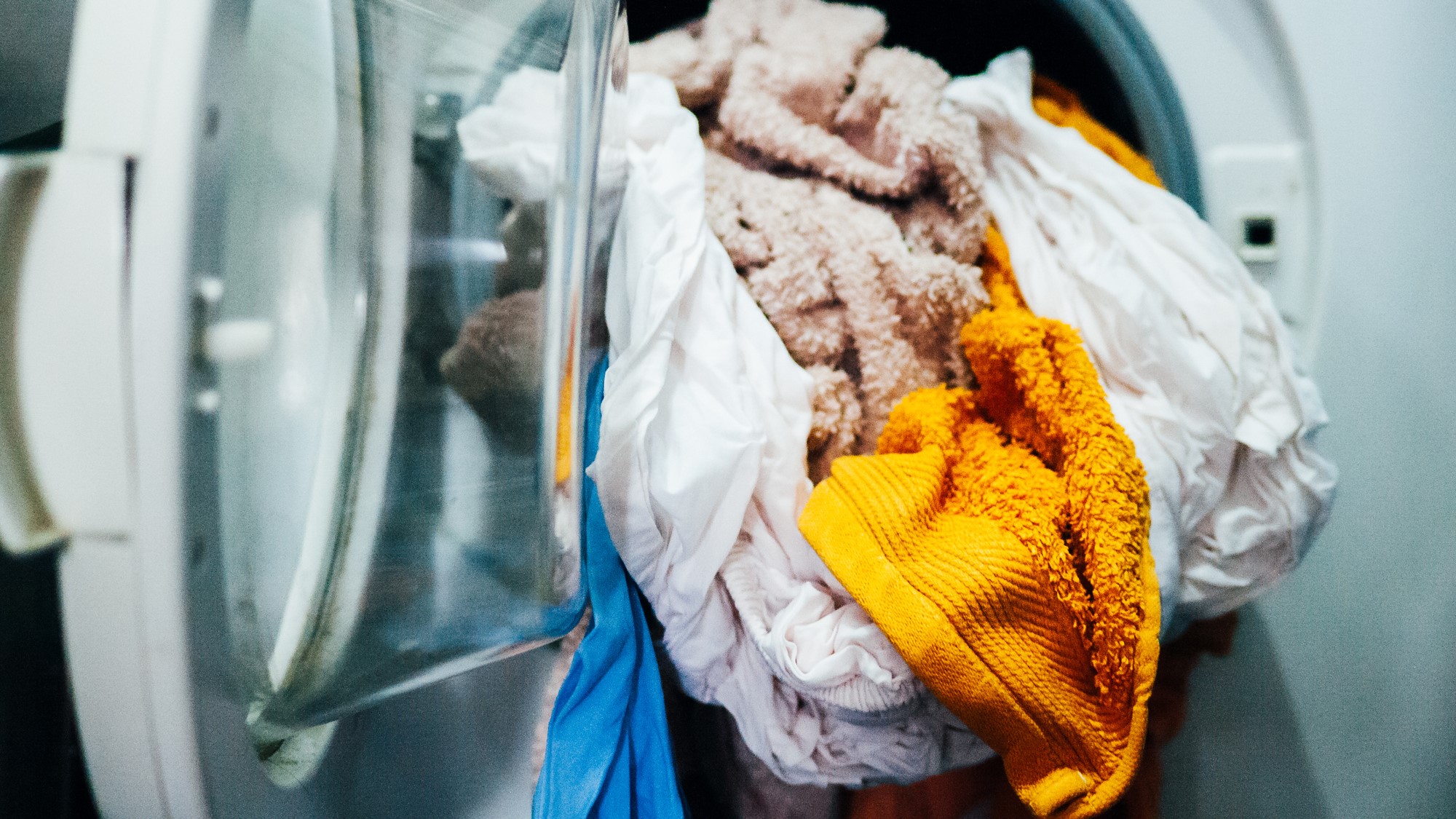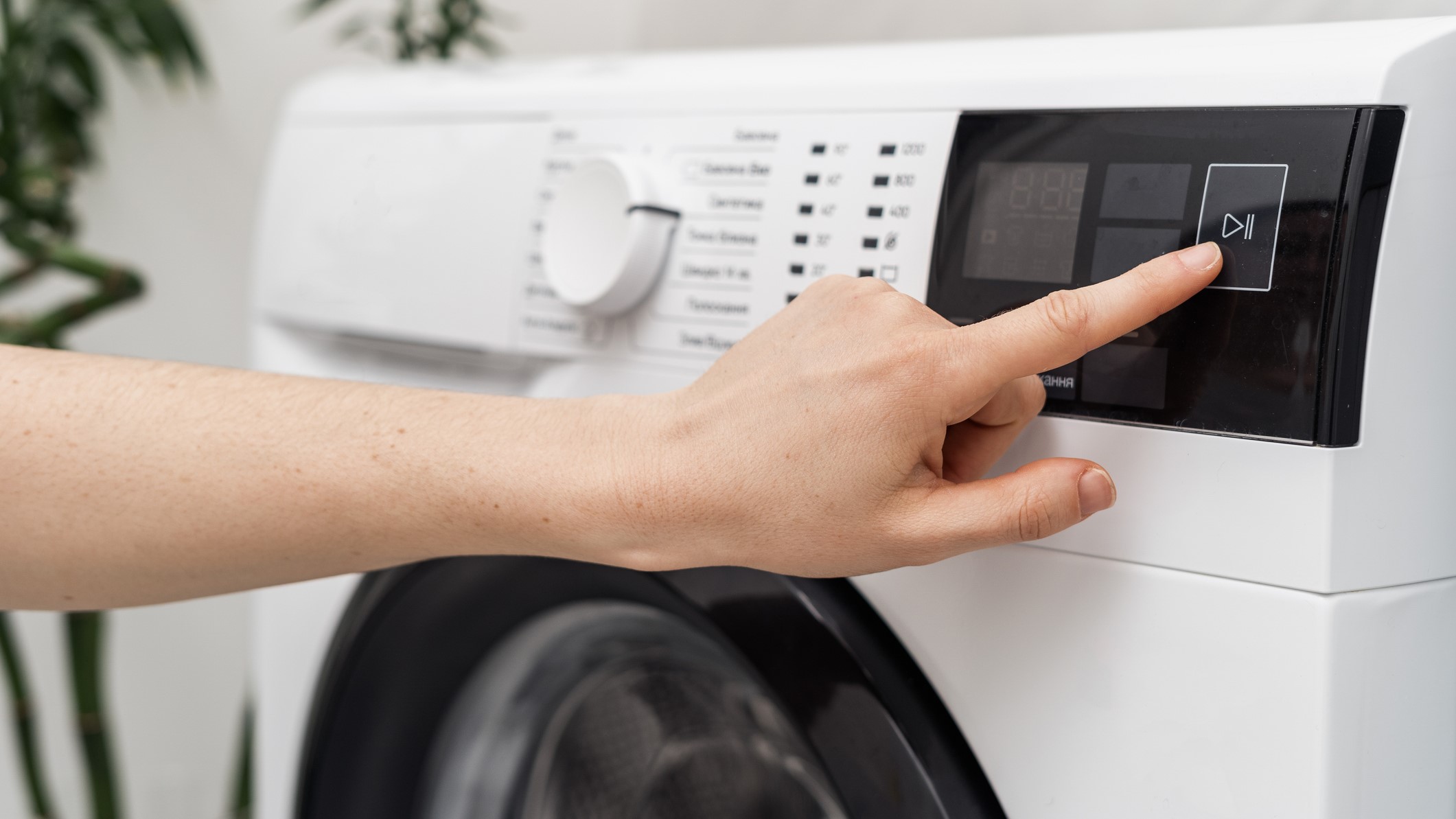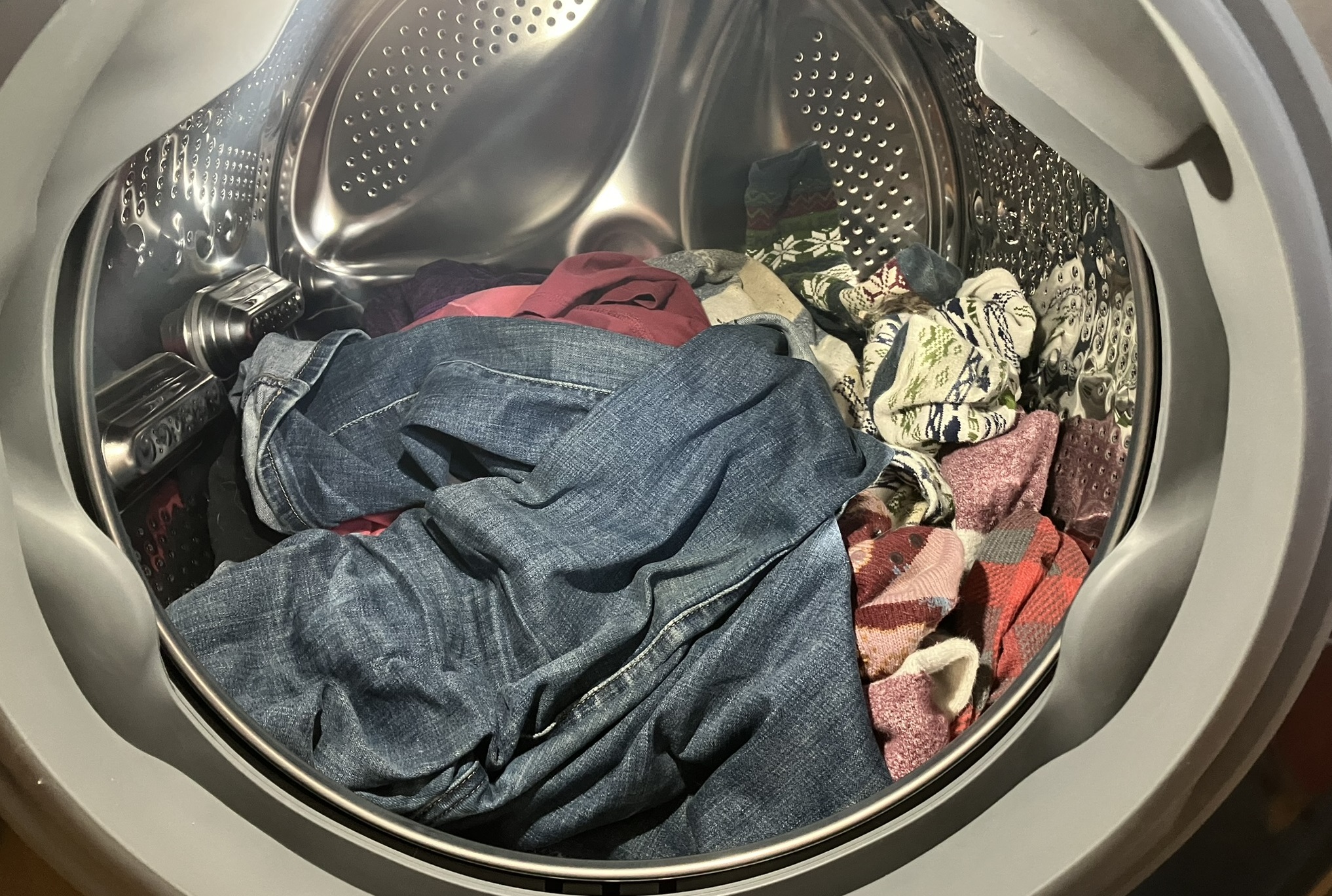What happens if you overload a washing machine? 7 damaging effects of cramming in laundry
Overloading your washing machine can cause more damage than you might think

Overloading your washing machine might seem like a time-saver in the short term, but it can lead to poor cleaning results and long-term damage to your appliance. So before you stuff that extra towel in and hope for the best, listen to laundry specialist Tyler Kungl's warning.
"Exceeding the maximum load capacity impairs the function of your washing machine," says Tyler. "Having an unbalanced load is one of the most common reasons your washing machine is not spinning. If the imbalance is too large, the spin cycle will not run or it'll reduce its speed to protect your appliance."
While the best washing machines come with technology to detect and prevent overloading, such as sensors that measure the load size and weight, not all of us can afford these high-end features. I've spoken to several laundry experts to find out just how much damage overloading can do to your washing machine (and your laundry). Plus I've got lots of tips and advice on how to avoid overloading your washer.
How do you know if you've overloaded your washing machine?
While this might seem obvious, the fact that many of us regularly overload our front load washer or top load washer suggests it's unclear to many! I know I've often stuffed a few more items into an already-packed washing machine and crossed my fingers that nothing would go wrong.
"Overloaded machines are a common occurrence, especially for large family households that do a lot of washing on a regular basis," says Delah Gomasi, a cleaning expert and founder of MaidForYou.
While we'll outline the signs and symptoms of an overloaded washing machine once it's running, how can you tell if you've added too much laundry before you switch it on?
"If clothes can't move freely throughout the wash cycle, then you've got an overloaded machine," says laundry expert Ken Doty. He suggests a nifty trick to identify whether you're guilty of cramming in too much. Pop your hand into the machine and ensure you can hold it vertically between the laundry and the top of the drum. "If your hand cannot comfortably fit on top of the load, there are too many pieces of clothing in there," says Doty.
Sign up to receive the latest news, reviews, buying guides and deals direct to your inbox
Here are some other tips on checking whether a washing machine is overloaded before switching it on:
- Check drum space: The clothes should fill about two-thirds of the drum, leaving enough room to move freely.
- Weight check: Refer to your machine’s user manual for its load capacity. Weighing the laundry can give a more accurate idea of whether it exceeds your machine's limit.
- Clump check: Clothes should be loosely packed, not clumped together. Tightly packed clothes mean the load is likely to be much too large.

CEO & Director of MaidForYou, Delah bootstrapped his business from scratch and became a professional cleaner in the process. He loves all things business and finding out the latest and greatest in cleaning trends, cleaning equipment, tools and technology.
What happens if you overload a washing machine?
Overloading your washing machine might seem like a shortcut, but it can lead to problems you’d rather avoid. From clothes coming out streaked with detergent to banging noises from your machine, it’s important to know when you’ve packed in too much. I've spoken to several laundry experts to find out more.
1. Your clothes won't come out as clean
Stinky or soiled clothing is one of the most common signs, according to our experts.
"Clothes usually have washing powder residue or suds left on them, even after they're left to dry," says Gomasi. "You'll see traces of white markings on the clothes where the powder hasn't been able to be washed off due to the overload."
"For synthetic materials, you'll notice that even after washing on a long cycle, the underarms will still smell due to not being exposed to enough laundry detergent and because the wash and agitate cycle is ineffective due to too many clothing items in the washing machine."
Cleaning operations manager Elizabeth Shields agrees. "When there’s no space for the laundry to swish around, the water and detergent can’t get to every item, leaving your clothes less clean than you'd expect. It might not even rinse properly, leaving residue. So when you pull out your laundry, it feels a little stiff or sticky."
Elizabeth Shields is the Operations Manager at Super Cleaning Service Louisville, a professional cleaning company based in Louisville, Kentucky. Aside from being a manager, Elizabeth showcases her diverse expertise as an author of online articles. Her writing prowess spans across a wide array of subjects, from insightful parenting advice to enlightening pieces on home improvement, wellness, and the topic of sustainability.
2. You'll have soggy, heavy laundry
If you've ever struggled to pull a soaked towel out of your washer, it's a sure sign that you've overloaded your machine. Overloading prevents proper spinning, which helps remove excess water. As a result, your laundry may come out sopping wet and heavier than usual because the machine couldn’t spin efficiently.

3. Clothes are excessively wrinkled
Cramming too many items into the drum leaves no room for movement. This leads to clothes being squashed and tangled, resulting in excessive wrinkling. Gomasi notes, "We find that clothes come out extremely wrinkled and need extensive ironing - even after they've been left to dry in the sun."
So, overloading your machine means you may need to do extra ironing or even a second wash to smooth things out, which is the opposite result you want when you're trying to save time.
4. Your machine shakes or makes unusual noises
An overloaded machine can struggle to handle the excess weight, causing the drum to spin unevenly. You may hear loud banging, thumping, or notice excessive shaking, which can damage the machine’s internal components.
This is because your machine starts working overtime, says Shields. "An overloaded washer has to work harder to spin and balance all that weight, and constantly overloading can put stress on the motor, belts, and other parts."
All that shaking and banging is likely to cause excessive wear and tear, says Gomasi. "You'll end up damaging the electrical components of the washing machine and you'll find that you'll have to replace your washing machine sooner than expected."
Laundry specialist Tyler Kungl has a tip to reduce the imbalance and stop excessive noise or movement. "If you have a single heavy item, such as a large towel or blanket, add one or two smaller items to balance out the load."

Tyler Kungl is the Head of Business Unit Laundry (North America) at BSH Region North America, a company that is home to both globally established appliance brands such as Bosch, Siemens, Gaggenau, and Neff.
5. Washing cycles take longer
If you have a washing machine with a sensor, it might detect an overload and try to compensate by extending the washing cycle. If you notice your cycle taking longer than normal, it could be the machine struggling to distribute the load.

6. Clothes come out damaged
"Washers that are over capacity can cause clothes to snag on zippers, buttons and other grabbable aspects of clothing," says Doty. "This can cause rips and tears within the fabric."
Shields says even clothes without snaggy items can be damaged. "When you overload, the friction between clothes can lead to extra wear and tear, not exactly what you want for your favorite outfits."

Ken Doty joined The Maids International in July 2013 as Vice President of Business Intelligence and was promoted to Chief Information Officer in February 2020. He is experienced in business intelligence with over 20 years of experience in consulting and information technology. He loves talking shop with other cleaning service professionals, and offering cleaning tips to anyone who asks!
7. Your energy bills go up
All the experts I spoke to agreed that overloading your washing machine can also hit you in the wallet.
As Doty points out, "A machine that has to work harder will take more energy and water to properly complete a laundry cycle." And that leads to higher utility bills.
Plus, if clothes come out too wet, your dryer will have to work overtime, adding to the cost.

FAQs
How do you avoid overloading a washing machine?
It depends on your laundry habits, your household size, and your daily activities. Our experts have some tips that may help, depending on your circumstances.
"Only wash like-for-like items," Gomasi suggests. "For example, wash whites with whites, underwear with underwear, socks with socks and shirts with shirts. When you're not combining bed sheets with towels and other laundry items that don't go together, you'll find your washing machine is less likely to be overloaded."
He also suggests using a dry cleaner for your expensive clothes. This limits the amount of washing you'll do, so your washing machine takes a smaller load.
Gomasi also points out that not all clothes meed to be washed frequently. "Unless it's gym wear, underwear, socks, or you're a smoker, you don't need to wash a lot of items after every wear," he says.
Shields also has a tip: "Personally, I fill the drum about 3/4 full. I also like to mix up the load with light and heavy fabrics to balance. If I’m washing blankets or comforters, I run a smaller load. These bulky items need more space."
Is underloading just as bad as overloading?
Underloading and overloading can both throw your washing machine off balance, but they do it in different ways.
Underloading happens when you don't fill the drum enough, leaving too much empty space. This can lead to a lackluster clean, as there isn’t enough friction to help wash your clothes properly. Plus, it can waste water and energy since the machine uses similar resources for any cycle, making it less efficient.
If you consistently wash small loads, the machine might not spin evenly, which can cause vibrations and noise. This can lead to wear on the suspension system over time.

Joanne Lewsley is a reputable freelance writer specializing in evidence-based health and lifestyle content. With a background in journalism and extensive experience working for known brands, Joanne rigorously tests and evaluates home gadgets. Her passion for writing is complemented by her love for the outdoors and live music.
